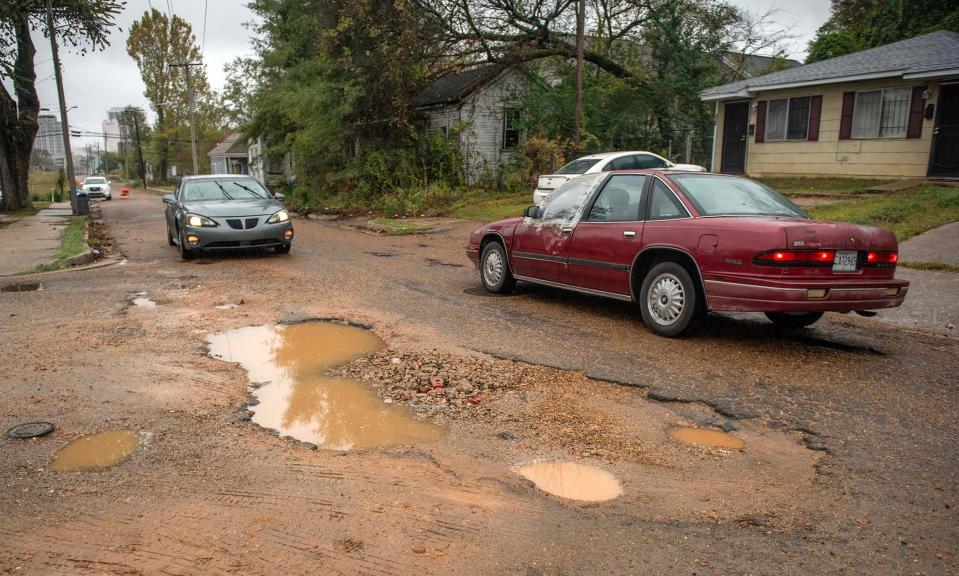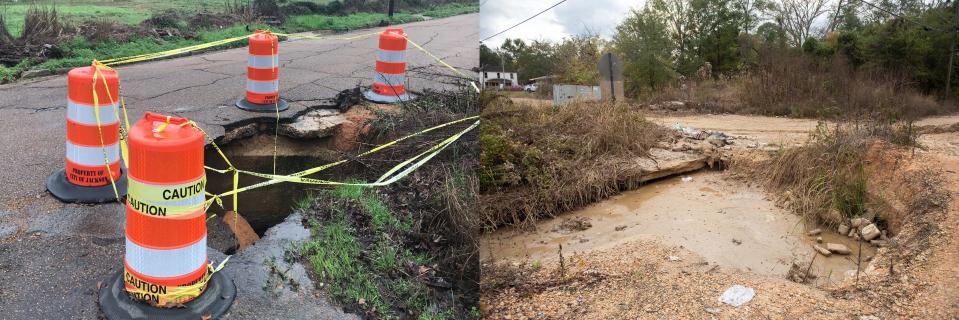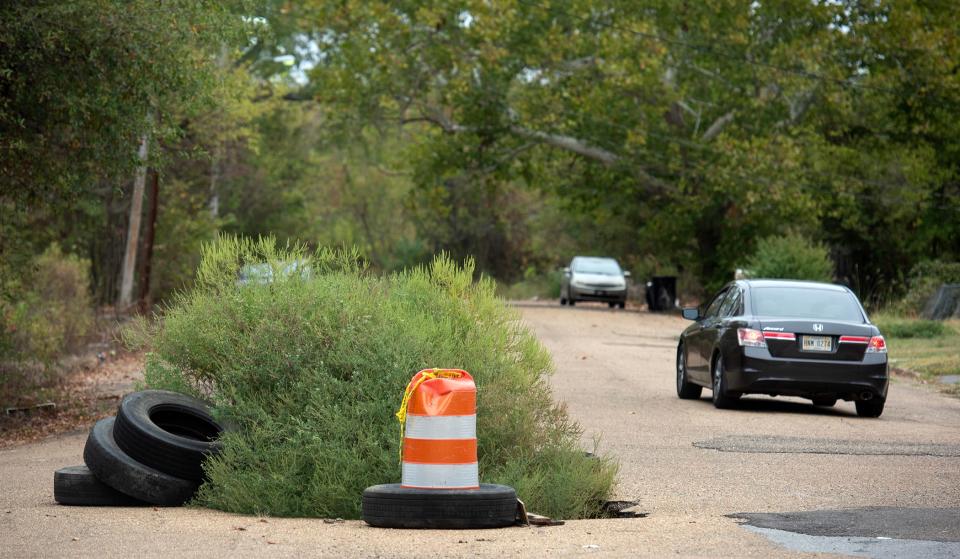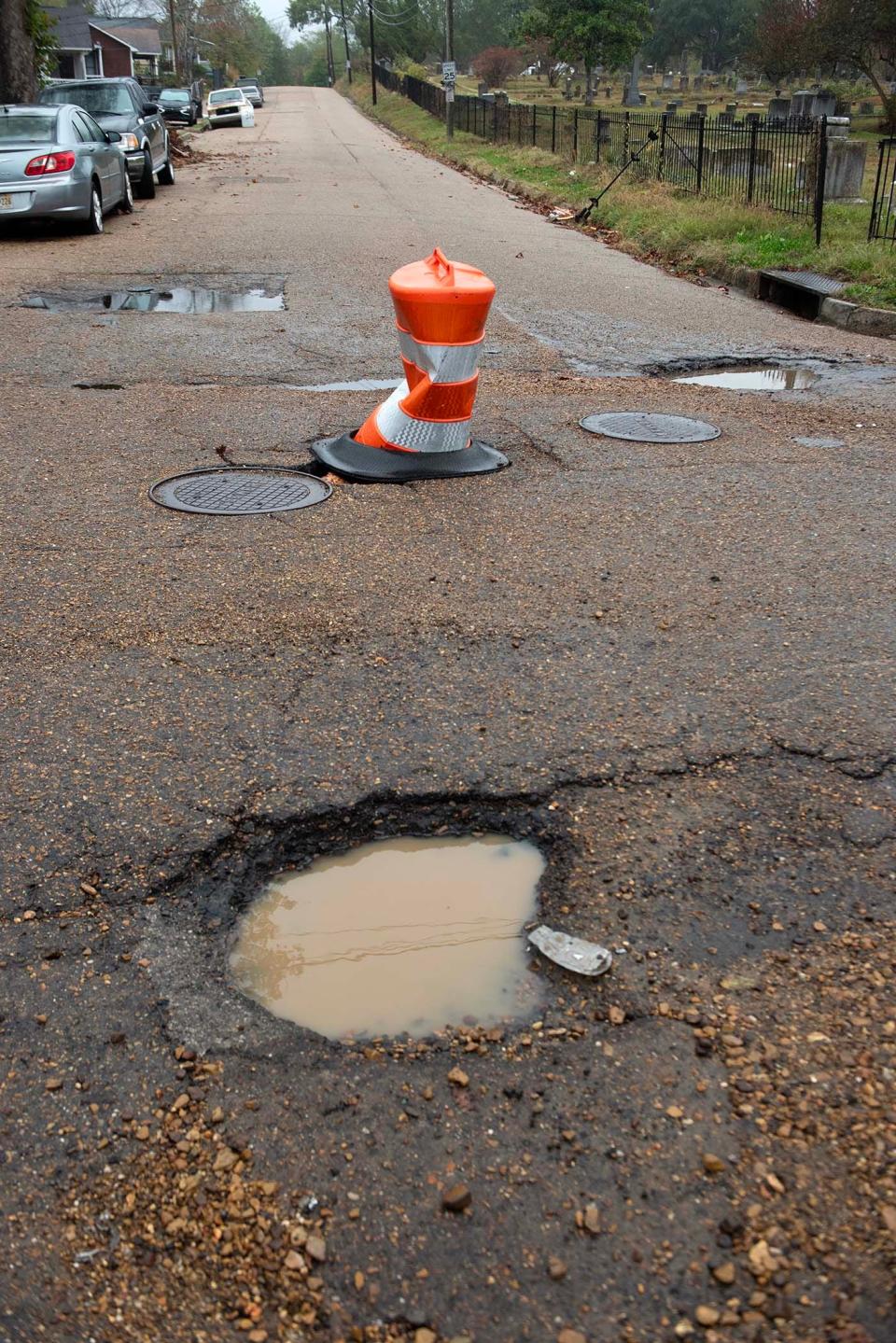Fixing Jackson's pothole problem: An overwhelming task for a division with 10-12 workers
Going from Point A to Point B in most places in the Capital City is guaranteed to be a bumpy ride.
It's no secret that Jackson's roads need some major improvements.
It's up to the city's Paved Streets Division, which falls within the Department of Public Works, to ensure the streets of Jackson are up to speed.
Currently, the Paved Streets Division has a list of 89 potholes throughout the city that need to be filled as of Nov. 8, according to city documents the Clarion Ledger obtained through a Freedom of Information Act request. The division gathers the list through calls from the 311 Action Line, which is available for residents to call for non-emergencies.
City Engineer Robert Lee, who has been acting as the Interim Public Works Director while the city continues to search for someone who will take the job, said the 89 potholes recorded are only the ones that residents called about, but there are most likely many more.
The reality is that there are thousands more potholes throughout Jackson's more than 100 square miles of land. Some potholes have shut down auto traffic to roads completely. Other potholes have large growths coming from them, taking on a life of their own. Yet others are filled with tires, barrels and other debris.

Lee said he couldn't give exact numbers of the amount of potholes in the city. Relying on the 311 calls is a major way for the paved streets division to find out about potholes and he encouraged more residents to call.
"Some neighborhoods, they call 311 right and left and report everything under the sun and I am very thankful for that," Lee said. "But other neighborhoods don't always report to 311 even if their street has 15 potholes and needs repairs up-and-down."
The paved streets division looks at the 311 reports, puts it on their work schedule, then go make the repairs, Lee said.
"Our paved streets division, unless they get a special assignment, they'll go review the 311 and go and tackle the 311 calls. Stuff like dips on uneven pavements, potholes, street cracking, street patching and utility cut repair," Lee said.
Other active repairs the paved streets division is currently working on, according to city documents the Clarion Ledger obtained:
173 curb and gutter repairs. The oldest request dates back to 2012.
41 situations of debris in street. The oldest request dates back to 2017.
102 driveway entrance repairs. The oldest request dates back to 2013.
87 leveling dips or uneven pavement repairs. The oldest request dates back to 2013.
3 roadway spills, which is win vehicular fluids or hazardous materials spills on the road. The oldest request dates back to 2021.
16 shoulder repairs. The oldest request dates back to 2013
106 sidewalk repairs. The oldest request dates back to 2012.
68 street cracking repairs. The oldest request dates back to 2015.
176 street patching repairs. The oldest request dates 2014.
577 utility cut, which deals with water and sewer lines, repairs. The oldest request dates back to 2014.
Adding all of those active repairs with the 89 potholes gives a total of 1,438 active requests the paved streets division is currently battling.

Hiring more contractors to help with the duties
Lee said the city hasn't hired contractors to help with repairs in the past, but "it's something we're looking into this year." He said the problem is too big to tackle with only the paved streets division. The division has about 10 to 12 workers right now, Lee said.
"There's always needs, but when you have a limited budget you've got to determine how best to utilize those resources but also make sure that we can bring folks in that can be an asset," he said.
Understaffing isn't just a problem in the public works department, but in most of the city's departments.
"We've only got so many folks … and if you want more crews you got to fund the positions, fund the equipment for those crews. We do have some money this year set aside for contractors for pothole patching and we're working through that process as how we get that contract out," Lee said

But it seems finding a company has been a bit difficult.
A contract went up for bid back in September, Lee said, but nobody responded. He said the city is trying to reach out to local asphalt companies to see why they didn't respond and "how we can make it a better product so they can submit prices on it."

Lee says most streets need to be repaved
Limited staffing in the paved streets division and contractors not responding to bids make it hard for pothole patching to take place. But Lee said even with that, the answer for some streets is to totally repave them.
"You can patch potholes and have crews all over the place. But what we got to be able to pivot to is we got to pave," Lee said. "At some point you're going to end up with a street, and you patch a pothole and then the pothole will come back and then you got patch in the patch."
Lee wouldn't say how much it costs on average to repave the street. He said you have to take into account factors such as how much asphalt costs, what kind of equipment is needed and how much a contractor might cost to do the work.
"It really depends on the type of street to get a ballpark cost," he said.
In October, the Jackson City Council voted to approve phase one of the city's "Street Resurfacing Project," which is total repaving of 31 streets in Ward 3 and Ward 7.
The project is overseen by the city's One Percent Sales Tax Commission, which uses 1% of tax revenue earned by sales tax to fund capital improvement projects. Lee said the city earns about $12 to $13 million per year on the 1% sales tax.
Lee said phase one of the project was supposed to start in early November, but bad weather forced the start date to be pushed back. He said it most likely will begin after Thanksgiving.
After this phase, the One Percent Sales Tax Commission will then pick other streets in the city that need repaving based on information provided by the public works department and council members.
There is also the matter of public works coordinating with JXN Water, the company currently in-charge of overhauling the city's water system. The company is headed by federally appointed Interim Third Party Water Administrator Ted Henifin.
JXN Water crews have started making repairs to water pipes underneath streets, such as work on West Fortification Street between Woodrow Wilson Avenue and Martin Luther King Jr. Drive that caused road closures for two months.
Lee said his department and JXN Water coordinate on which repairs they are going to tackle and what the time frame of those repairs is going to look like. He said he meets with Henifin most weeks.
"There's definitely coordination with JXN Water water teams and sewer teams," Lee said.
City Council starting process of entering into bond for streets, bridges and drainage
Last week, the Jackson City Council voted to start the process of entering into a loan agreement with the Mississippi Development Bank, which was created by the Mississippi Legislature in 1986 as a way for local governments to borrow money to finance infrastructure improvements.
The Council voted to enter into a loan agreement in an amount not to exceed $40 million.
But there was some concern from Ward 1 Councilman Ashby Foote, who spoke during the Council's Public Works Committee meeting last week, about entering into this loan agreement without first having a plan of how the money will be spent
"My concern as I mentioned in the last meeting is the lack of a specific plan to spend the money in a constructive manner and get our money's worth," Foote said. "I would like to see a specific plan of here's how we're going to spend $15 million and here's the projects … to say, 'Well, we're going to come up with them down the road,' or whatever, then we shouldn't be borrowing."
In response to Foote's concerns, Lee said he would like to hear more input from Council members about priority infrastructure projects in their wards so he can make a list. The Council members agreed.
"I really like the idea of the Council members being able to prioritize projects, but I hear what Mr. Foote is saying, too, that he doesn't want us to approve these funds without having an idea what they're going to be spent on," said Ward 7 Councilwoman Virgi Lindsay.
Lindsay is the chairwoman of the Council's Public Works Committee.
The Council members decided they would come up with a list of priority projects in each ward they would give to Lee, then they would split the amount of money that would be issued by the loan from the Mississippi Development Bank so each ward would have an equal share.
If the Council decides to borrow $40 million, that means each ward will see a little under $6 million for infrastructure improvements.
"We just wanted an equitable distribution (of the funds)," said Ward 2 Councilwoman Angelique Lee.
After the meeting, Robert Lee said he thinks it's a good idea to hear input from the Council members, but also said entering into the loan agreement will help kickstart larger infrastructure projects the city needs to have cash on hand to start, such as improving major roads in the city such as Medgar Evers Boulevard.
"From a functional standpoint having upfront cash to do several large projects will allow us to get these priorities done, while still allowing us to have money to address spot work, small projects and emergencies," Lee said.
Benefits of the MS Development Bank
According to their website, the benefits of entering into a loan with the Mississippi Development Bank, instead of another bank:
Ready access to bond funds.
Provides for a higher bond rating, resulting in lower interest rates.
Does not count against a local government general obligation debt limit.
Allows smaller units of government, that may be unable to issue stand-alone revenue bonds, to issue bonds through the Mississippi Development Bank.
Greater flexibility in payment structure, bond covenants, and debt service coverage requirements.
Tax-exempt interest rates for a period of up to 30 years.
Also, if a local governmental entity fails to make debt service payments on the bonds issued by the Mississippi Development Bank, the State Tax Commission can withhold sales tax, homestead exemption, and other funds to make those payments.
This article originally appeared on Mississippi Clarion Ledger: Repairing the City of Jackson pothole problem

